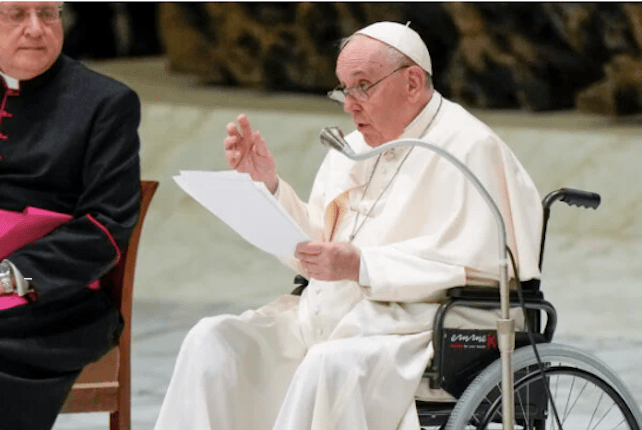Despite the pain in his knee, Pope Francis has a heavily packed schedule for July, when he plans to go on two demanding papal trips, one to South Sudan and Congo and another to Canada. The pope will not be hosting general audiences and prayer services in July for the traditional summer break.
Doctors interviewed on numerous Italian media outlets have stated Pope Francis should undergo a rather simple surgery to relieve his knee pain, which is now worsened by arthritis. But speaking to Italian bishops May 23, Francis said, “I’d resign rather than undergo surgery.”
What has most fueled conversations about a possible retirement is Francis’ decision to visit the Basilica of Collemaggio in the town of Aquila, where Pope Celestine V, who retired from the pontificate after curial opposition, is buried. Some seven centuries later, Pope Benedict XVI visited the holy site in 2009, four years before he would hand in his resignation, and laid his pallium, a liturgical vestment symbolizing papal authority, before the tomb.
The basilica is also considered to be the birthplace of the papal jubilee, since Celestine first instituted the complete pardon of sins for whoever entered the church.
For Maradiaga, reading Francis’ visit to the basilica as a sign of his imminent resignation constitutes a “cheap soap opera,” and in the interview the cardinal stated that “the trip to Aquila was already planned, planned for a long time.”
According to the cardinal, rumors of Francis stepping back from the pontificate are fomented by his critics. In a virtual news conference on Tuesday, Maradiaga said the pope is faced with a “sit-down strike” by members of the Curia who oppose his reforms, made clear by the fact that the apostolic constitution has not yet been translated into other languages apart from Italian.
RELATED: Vatican bank displays financial decline, moral gains after papal reforms
Emeritus Pope Benedict XVI has been living inside the Vatican since his resignation, and while keeping a low profile, he has become a symbol for Francis’ critics who preferred the traditional bent of the German pontiff. There is no canon law that determines what happens to pontiffs who choose to resign, which might become more frequent as medical improvements stretch the longevity of popes.
Creating a legal framework for the role of the emeritus pope “is not a necessity,” said Monsignor Juan Ignacio Arrieta, the secretary for the Pontifical Council for Legislative Texts, while speaking to a handful of reporters, including Religion News Service, on May 24.
“Many are thinking about this,” Arrieta admitted, adding that “handling these situations is hard.” He said little can be gained from the experience of retiring bishops in dioceses, since even in those cases the transition is rarely smooth. He also said that as the supreme legislator, popes can change laws at will, meaning if a law for emeritus popes were to be made now it doesn’t mean that the next pope would not change it or eliminate it.
“We leave all things to people’s common sense,” Arrieta said.
RELATED: The Catholic bishops support gun control. Why don’t we hear more about it?
This article originally appeared on ReligionNews.com.


